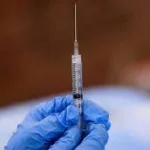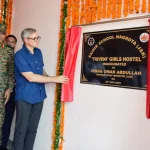Srinagar, Dec 15: In a significant development towards addressing water crisis in far flung areas, the Jal Jeevan Mission (JJM) Scheme has brought unprecedented joy to three villages of Karnah in north Kashmir’s Kupwara district by providing them with portable water supply . For the first time since independence, the villages of Batlan, Chambra, and Darya are now reveling availability of tap water which has given immense happiness to them.
Expressing their heartfelt gratitude, the villagers attribute this transformation to the visionary leadership of Prime Minister Narendra Modi, who launched the scheme with the noble aim of providing portable water to residents along the Line of Control (LoC). Previously, the women of these villages undertook arduous journeys of 2-3 kilometers to fetch water, braving challenging terrains and harsh winters.
The women in the villages commended the district administration of Kupwara, especially Deputy Commissioner Ayushi Sudan, for pushing the department to complete this life-altering project expeditiously. They shared their disbelief at the dream-like reality of having tap water in their villages, emphasizing the significant relief it has brought, particularly during the peak winter months.
Expressing happiness, the women revealed that they have been given freedom from the struggles of fetching water from distant and polluted sources. An elderly resident Kalo Gorsi of Batlan acknowledged the Jal Jeewan Mission’s transformative impact, highlighting the monumental change in a region that was once deemed inaccessible.
An official from Kupwara district confirmed the remarkable development, underscoring the district’s commitment to reaching far-flung areas. This success story unfolds in an area nearly 90 kilometers from the district headquarters, where recent road connectivity has paved the way for progress.
Pertinent to mention here, the Jal Jeevan Mission (JJM), a flagship program of the Government of India, was launched on August 15, 2019, by Prime Minister Narendra Modi. The program is a crucial step towards achieving the United Nations’ Sustainable Development Goal 6, which aims to ensure access to water and sanitation for all.





